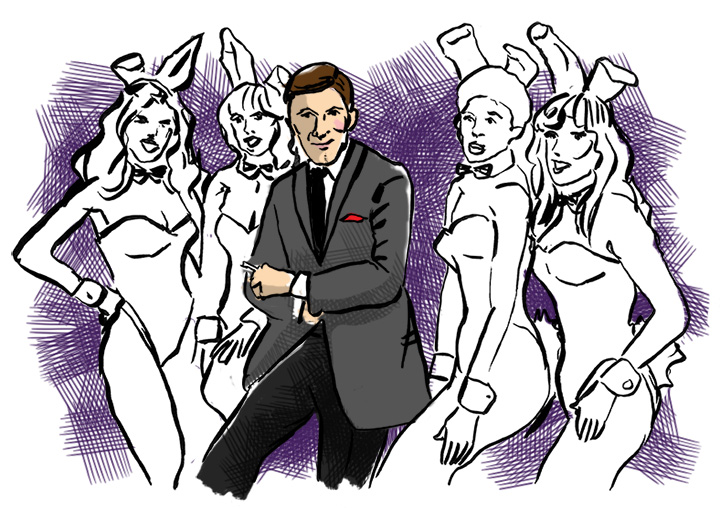
Victor Lownes passed away at the age of 88. He spent the last few years of his life in seclusion, rarely making any public appearances. It was a sad ending for such an extroverted and influential man. You’ve never heard of Victor Lownes? I’m not surprised.
At 18, Victor married Judith Downs. He had a managerial position at Yale Locks, a company that was owned, in part, by his maternal grandfather. Victor was successful, with a home, a loving wife and two children — but he experienced a premature mid-life crisis. He abandoned his family and moved to Chicago to look for something more fulfilling.
In 1954, he met Hugh Hefner at a party. The two men shared mutual interests — drinking, women, partying — and Hefner asked Victor if he would write a few articles for his proposed magazine. Victor obliged and Playboy was launched the next year. Victor accepted Hefner’s offer to join his company as Director of Promotions. His first order of business was to convince otherwise stuffy and conservative businesses to advertise in the fledgling publication. Victor was, again, successful. His success translated to greater success for Playboy Enterprises.
Victor and his boss/friend Hugh Hefner frequented many popular bars in Chicago. Out for drinks one evening, Victor suggested to Hefner that Playboy should open its own club. Hefner liked the idea a lot. When Victor suggested that the waitresses dress in costumes patterned after Playboy‘s “rabbit” mascot, Hefner balked. He had always envisioned the rabbit as a male figure. Victor showed Hefner a prototype of the costume and Hefner was one-hundred percent on-board. The first Playboy Club opened in February 1960 and more soon followed.
In 1966, Victor opened a Playboy Club in London to instant success. The club, known as “The Hutch on the Park,” regularly hosted A-list celebrities like The Beatles, Warren Beatty, Michael Caine, Judy Garland, Sean Connery and Roman Polanski. This club featured casino gambling, which Victor speculated would rival the profits of Playboy magazine. He was right and soon the casino venture was generating more income than the company’s publishing interests. By 1981, Playboy Enterprises became the most successful casino operators in the United Kingdom.
Ensconced in the celebrity lifestyle, Victor was the executive producer of the Monty Python film, And Now For Something Completely Different. he insisted to animator Terry Gilliam that his credit be in a font larger than all the others. Gilliam refused, so Victor hired an outside animator to complete the credit, giving it to Gilliam to insert into the film. In the meantime, Gilliam changed the style for the credits, making Victor’s name look awkward and out of place.
Victor was persuaded by his pal, director Roman Polanski, to finance his production of Macbeth in 1971. Victor gave Polanski $1.5 million. The production went $600, 000 over budget and was an eventual flop. Then, Polanski publicly mocked Playboy’s, specifically Victor’s, generosity — leading to the end of the friendship.
Victor was brought back to the United States to head up Playboy’s domestic casino endeavor. However, British gaming authorities were investigating Victor’s business “irregularities,” prompting Hefner to unceremoniously sever all ties with his one-time “golden boy.” It was too late, though. Playboy’s British gaming licenses were revoked and their US permits were not renewed. Playboy’s once-thriving casinos had lost more that $51 million by June 1982.
Victor, on the other hand, came out smelling like a rose. He had amassed a fortune as Britain’s top paid company executive. He owned a large mansion and married “Playmate” Marilyn Cole, over whom he and Hef actively competed. He even reconciled with Roman Polanski, but remained estranged from Hefner.
